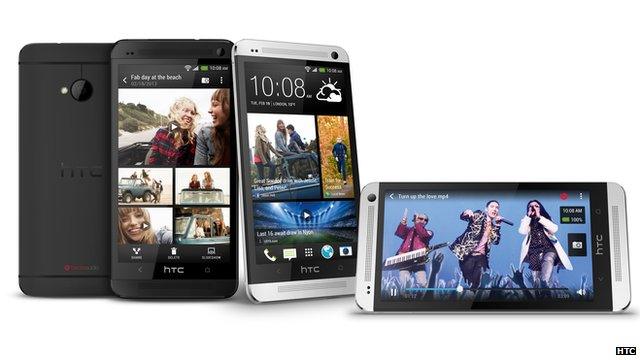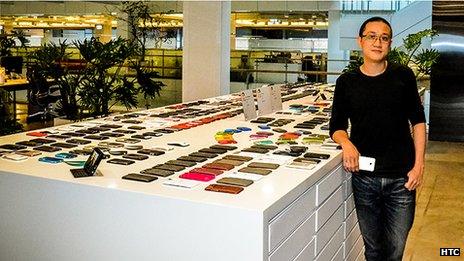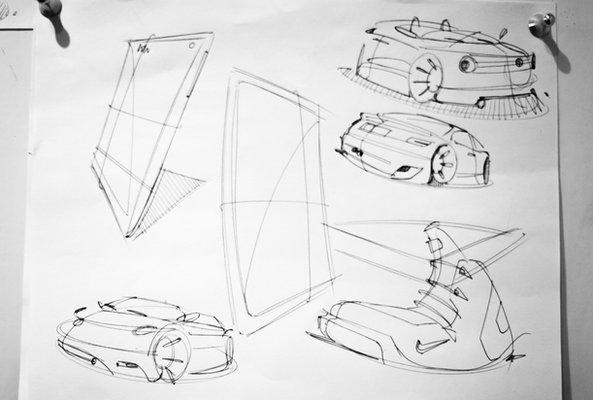Can HTC's new phone challenge Apple and Samsung once again?
- Published
Katia Moskvitch visits HTC's headquarters in Taiwan
Yes, this phone is sleek, elegant and finely crafted, but can it be more than just a slab of metal?
For Taiwanese smartphone maker HTC, a lot is riding on its appeal.
The new HTC One, shown exclusively to the BBC at the company's headquarters in Taiwan's capital Taipei weeks before its official launch, differs starkly from HTC's previous phones - and from many other smartphones currently on the market.
Like the iPhone 5, it has a unibody made out of metal.
"It's just like your watch - you don't need a plastic watch," says Thomas Chien, one of HTC's vice-presidents of design, as he caresses the aluminium body of the handset.
But the HTC One is launching into an utterly crowded market, dominated by Samsung with its Galaxy S3 and Apple with its iPhone 5.
Fighting for the number three spot is a gaggle of players, from Blackberry and Nokia to LG and HTC. Snapping on their heels are new players from China like Huawei and ZTE.
It's in stark contrast to just a few years ago, when HTC looked like the only plausible challenger to Apple and its iPhone.
For its fightback, HTC has packed its new Android-based smartphone with innovations that the company says create a "totally new experience".
"We think it's the first time we came up with a design not just from the hardware side - it's kind of a new experience from outside and inside," says Mr Chien, sitting in an open-plan office on the 15th floor of HTC's headquarters.
Pixel density

HTC One is packed with innovation - both on the inside and the outside, according to the firm's designers
He takes me to a large table littered with mobile phones of all shapes and colours, next to paper sketches of early designs for the HTC One.
Mr Chien picks up a slab of solid aluminium: "That's how it all starts." The metal is ground, cut, pierced, polished, and then packed with electronics and finished off with a 4.7in (12cm) display, offering an industry-leading 468 pixels per inch (ppi).
Most people can't see the difference in quality beyond 300ppi but Mr Chien says the pixel density is still important, because it can display much finer detail.
"We always push boundaries. You never really define that something is enough for humans," he says.
HTC also hopes to make a difference with features like BlinkFeed, a live stream of personalised content that shows up on the phone's home screen when it is switched on; the so-called Living Gallery that merges stills and video; dual front-facing speakers promising, says HTC, a better music experience.
Innovation, however, does not guarantee success. HTC's previous flagship phone, the HTC One X, was praised by the tech-savvy. A reviewer at hip technology website The Verge called it "one of the best mobile devices I've ever used".
Tech blog Engadget described the One X as "a masterpiece", while Pocket-lint accorded it the same score as Samsung's top-selling Galaxy S3.

Designer Thomas Chien has been with the company since the very beginning
Slumping sales
Yet, despite all the features and praise, it was Samsung's Android phone that snatched the crown as the world's top-selling smartphone, followed by Apple's iPhone 4S.
The HTC One X struggled and company profits plummeted - in the last quarter of 2012, down a massive 91% on the previous year.
So what went wrong?
Lu Chun-kuan, a senior research analyst at Gartner Taiwan, points to fierce competition in the smartphone market.
"It's getting more and more difficult - it's not only the competition from Samsung and Apple, but also from the low-end devices of the Chinese players who are catching up very fast," he says.
"I think the key is that HTC needs to make sure that consumers are aware of the new technology it can bring them.
"Last year, [two HTC Android smartphones] the Butterfly and the One X were actually very good devices, but their sales were not as good as the company expected.

For an earlier phone design, HTC drew inspiration from a shoe
"This is more than just [doing enough] TV ads - it's the correct way of marketing, how they deliver the correct message to consumers, so that they get that this device is as good as Apple's iPhone and Samsung's Galaxy S."
HTC's chairman Peter Chou readily admits to the BBC that the firm faced challenges last year. But he says the new phone will help the Taiwanese company turn things around: "We've created the best smartphone on the market; we just need to let the world know about it."
To gain traction in the market, HTC aims to do better marketing than last year, focusing on tech-savvy people, the very same crowd that is now so taken in by the iPhones and Galaxy devices.
"Rather than trying to talk to everyone, we will be engaging with people who are seeking an alternative experience," says Mr Chou.
"We will be smart and nimble in our marketing. You will see us take bold risks."
Moving in step
While carving a phone out of metal could qualify as taking a bold risk - at least in terms of technology - HTC must make sure that its new "hero" phone does not stumble at other hurdles; the One X, for example, had trouble shaking off criticism for its relatively short battery life.
"At the end of the day, a good product will sell itself," says Scott Croyle, HTC's other vice-president of design, who once told the BBC that he had drawn inspiration for a handset from a sports shoe.
"To be a successful company, there are a lot of moving parts," says Mr Croyle.
"And absolutely - can HTC do better? Yes, I think all of us can do better.
"I think this year we've really focused on innovation and execution. And execution not only in terms of design and engineering, but getting the whole company to move in step as we launch the phone."
For the HTC One to be successful, it requires more than just a feat of engineering.
- Published19 September 2012
- Published19 September 2012
- Published18 October 2012
- Published9 October 2012